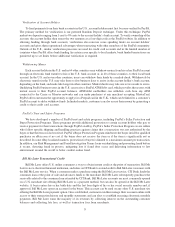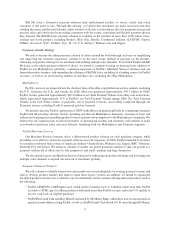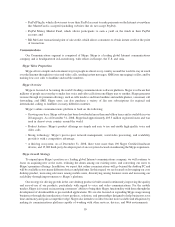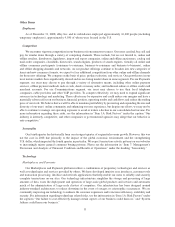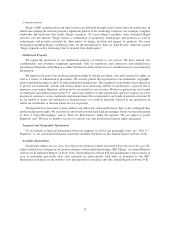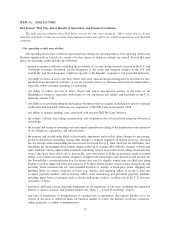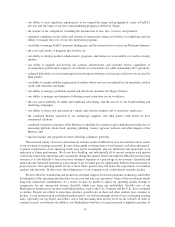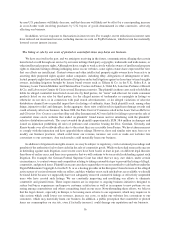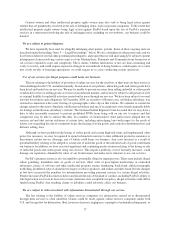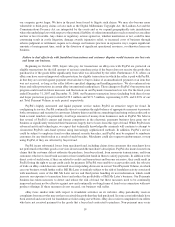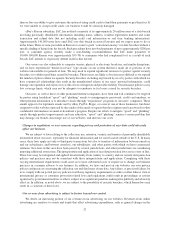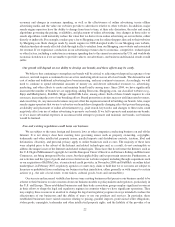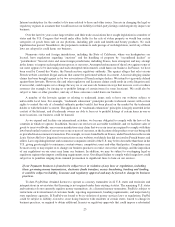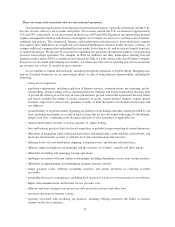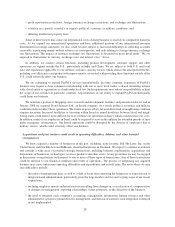eBay 2008 Annual Report Download - page 26
Download and view the complete annual report
Please find page 26 of the 2008 eBay annual report below. You can navigate through the pages in the report by either clicking on the pages listed below, or by using the keyword search tool below to find specific information within the annual report.other theories based on the nature and content of the materials disseminated through their services. Several private
lawsuits seeking to impose liability under a number of these theories have been brought against us, as well as other
online service companies. In addition, domestic and foreign legislation has been proposed that would prohibit or
impose liability for the transmission over the Internet of certain types of information. Our service features a
Feedback Forum, which includes information from users regarding other users. Although all such feedback is
generated by users and not by us, claims of defamation or other injury have been made in the past and could be made
in the future against us for not removing content posted in the Feedback Forum.
Furthermore, several court decisions arguably have narrowed the scope of the immunity provided to Internet
service providers like us under the Communications Decency Act. For example, the Ninth Circuit recently held that
certain immunity provisions under the Communications Decency Act might not apply to the extent that a website
owner materially contributes to the development of unlawful content on its website. In addition, the Paris Court of
Commerce has ruled in the Louis Vuitton Malletier and Christian Dior Couture cases that applicable laws protecting
passive internet “hosts” from liability are inapplicable to eBay given that the content in question was provided by
users under eBay’s control and authority. This trend, if continued, may increase our potential liability to third parties
for the user-provided content on our sites, particularly in jurisdictions outside the U.S. where laws governing
Internet transactions are unsettled. If we become liable for information provided by our users and carried on our
service in any jurisdiction in which we operate, we could be directly harmed and we may be forced to implement
new measures to reduce our exposure to this liability, including expending substantial resources or discontinuing
certain service offerings, which would negatively affect our financial results. In addition, the increased attention
focused upon liability issues as a result of these lawsuits and legislative proposals could require us to incur
additional costs and harm our reputation and our business.
Government inquiries may lead to charges or penalties.
A large number of transactions occur on our websites on a daily basis. Government regulators have received a
significant number of consumer complaints about both eBay and PayPal, which, while small as a percentage of our
total transactions, are large in aggregate numbers. As a result, from time to time we have been contacted by various
foreign and domestic governmental regulatory agencies that have questions about our operations and the steps we
take to protect our users from fraud. PayPal has received inquiries regarding its restriction and disclosure practices
from the Federal Trade Commission and regarding these and other business practices from the attorneys general of a
number of states. In September 2006, PayPal entered into a settlement agreement with the attorneys general of a
number of states under which it agreed to pay $1.7 million to the attorneys general, shorten and streamline its user
agreement, increase educational messaging to users about funding choices, and communicate more information
regarding protection programs to users. We currently face inquiries from government regulators in various
jurisdictions related to actions that we have taken that are designed to improve the safety of transactions on
our websites, most notably by requiring PayPal to be offered and/or used for certain high-risk transactions or by
certain sellers in certain jurisdictions, and we may face similar inquires from other government regulators in the
future. For example, the Reserve Bank of Australia is currently reviewing our policy requiring sellers to offer
PayPal as a payment alternative on most transactions on our localized Australian website and precluding sellers
from imposing a surcharge or any other fee for accepting PayPal as a payment method. Similarly, Bill Me Later has
from time to time received customer complaints that could result in investigations into Bill Me Later’s business
practices by state or federal regulators. As a result of the current credit crisis, we expect new laws and regulations to
be imposed on providers of credit. We are likely to receive additional inquiries from regulatory agencies in the
future, including under existing or new credit laws or regulations, which may lead to action against us. We have
responded to all inquiries from regulatory agencies by describing our current and planned antifraud efforts,
customer support procedures, operating procedures and disclosures. If one or more of these agencies is not satisfied
with our response to current or future inquiries, we could be subject to enforcement actions, fines or other penalties,
or forced to change our operating practices in ways that could harm our business.
We are subject to general litigation and regulatory disputes.
From time to time, we are involved in other disputes or regulatory inquiries that arise in the ordinary course of
business. The number and significance of these disputes and inquiries have increased as our business expands and
18


